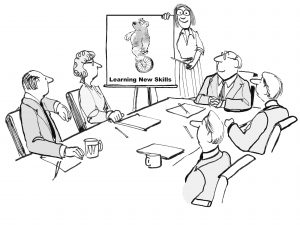GUEST BLOGGER: Kathryn Biel
I have a pet peeve. Okay, I have many, but one of my biggest ones is when people justify actions with the excuse of, “That’s what we’ve always done.” You know you’ve heard it. Maybe you’ve even said it. Next time those words leave your mouth, I want you to stop and think.
Just like with our students, we have to analyze task. We need to look at the overall end goal, as well as individual task components. If you’ve been doing something the same way for more than a decade, maybe it’s time to stop and perform some task analysis. This goes not only for our paperwork, but for our treatments as well.
This means we have homework.
As clinicians, it is our responsibility to stay abreast of research and breakthroughs. I don’t know about you, but my school days were a long time ago. Certainly not in this century. I would hope that in the past few decades, we’ve learned more. We’ve proven what works, or what doesn’t. Certainly the foundations of function remain the same—or do they? What have researchers proved? And then, how does it impact your treatment theories? How does new technology impact what you are doing? What new technology is even out there and how does it work?
Understanding the building blocks of the neurological and musculoskeletal systems is key in applying the new, evidenced-based techniques out there. One of the biggest problems in the motor therapy field is the lack of evidenced-based research out there (take Sensory Integration, for example). As clinicians, we must do our homework so that we can educate not only the teachers, but the parents and students as well. Explaining to a teacher why a child with a slumped posture will have difficulty with attending. Telling a parent that his or her child may not be defiant but in a heightened state of arousal and engaging the fight or flight reflex are examples of how as clinicians we need to understand current motor and learning theories.
In the schools, we’re looking to maximize our effectiveness in a minimal amount of time. This means truly understanding how to influence a child’s brain and system for longer than 30 minutes, twice a week. To learn more about how to effectively do this, check out Bobby Nabeyama’s presentation: Evidence Based School Practice: Therapeutic Implications of Current Knowledge on How the Brain Works, Motor Control, and Motor Learning at the Seventeenth Annual Therapies in the School Conference.
~Kathryn Biel, PT, DPT
]]>



